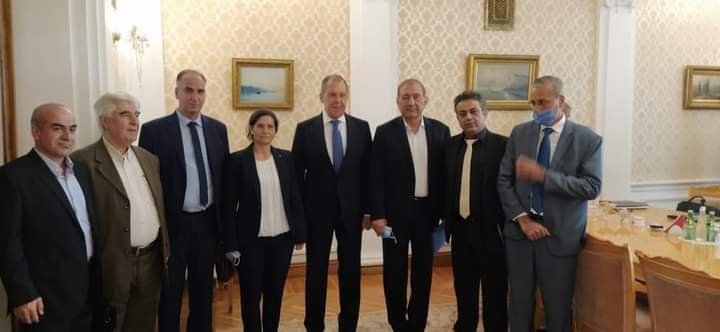Russia’s efforts to start dialogue between SDC and Damascus continue
HASAKAH, Syria (North Press) – Russia’s efforts to start a dialogue between Syrian government and Syrian Democratic Council (SDC) continue in light of Russia’s stress on the latter’s participation in the intra-Syrian dialogue, a Syrian politician said on Saturday.
Two days ago, Badran Jia Kurd, deputy co-presidency of the Autonomous Administration of North East Syria (AANES) said “Moscow is trying to develop a dialogue with the Damascus government.”
Rami al-Sha’er, a politician based in Russia, told North Press that in the coming days, the Russian Minister of Foreign Affairs, Sergey Lavrov, will meet again with a delegation of Syrian Democratic Forces (SDF) leaders.
Since the beginning of the crisis, Moscow has been trying to play the role of mediator between the SDF and SDC on one hand, and the leadership in Damascus on the other, al-Sha’er added.
He pointed out that Russia succeeded at some times by organizing meetings, but the situation changed after the start of cooperation between the SDF and the USA.
Since late 2014, the SDF has been coordinating with the US-led Global Coalition forces regarding the war against the Islamic State (ISIS), and Washington considers the SDF as a partner in the war against the extremist organization.
Al-Sha’er indicated that Moscow appreciates the role of the SDF in the war against terrorism.
“Therefore, we must take into account their legitimate demands and how to prove their national rights in the new Syrian constitution, within the framework of the unified Syrian state,” he noted.
The Syrian politician stated that Russia understands the circumstances that have resulted in the areas where the Kurds are present, “but the leadership in Damascus has another viewpoint in this regard.”
“Damascus’ excuse for stopping the discussion with the Kurds is the division within the Kurdish parties that should be talked to.”
But the meetings of Russian officials with the SDF, the Kurdish National Council in Syria (ENKS) and other Kurdish figures, negate this pretext, according to the political analyst.
He pointed out that Moscow does not see there is any divergence or division in the just Kurdish positions or demands.
Al-Sha’er considered that the more precise and specific the Kurdish demands are, the more Moscow will help in playing a more effective role in meeting the efforts of rapprochement with Damascus.
Commenting on the Turkish threats to launch a new military operation against the SDF in northern Syria, al-Sha’er mentioned that both Russia and America are trying to ease the tension between Turkey and the SDF, to avoid any military friction, any casualties on both sides, and to focus attention on directing all possibilities to eliminate the remaining extremists.
“Russia stresses, in all bilateral meetings with Turkey, or meetings at the level of the Astana rounds, the territorial integrity of Syria.”
He pointed out that this goal means that Turkey has to and will withdraw from all Syrian territories with the beginning of the political transition process in Syria based on Security Council Resolution No. 2254, a process in which representatives of the SDF must certainly participate.
The politician pointed out that Moscow and Washington will not accept any opposite approaches or the imposition of a new administrative reality by Turkish forces in Syria.

